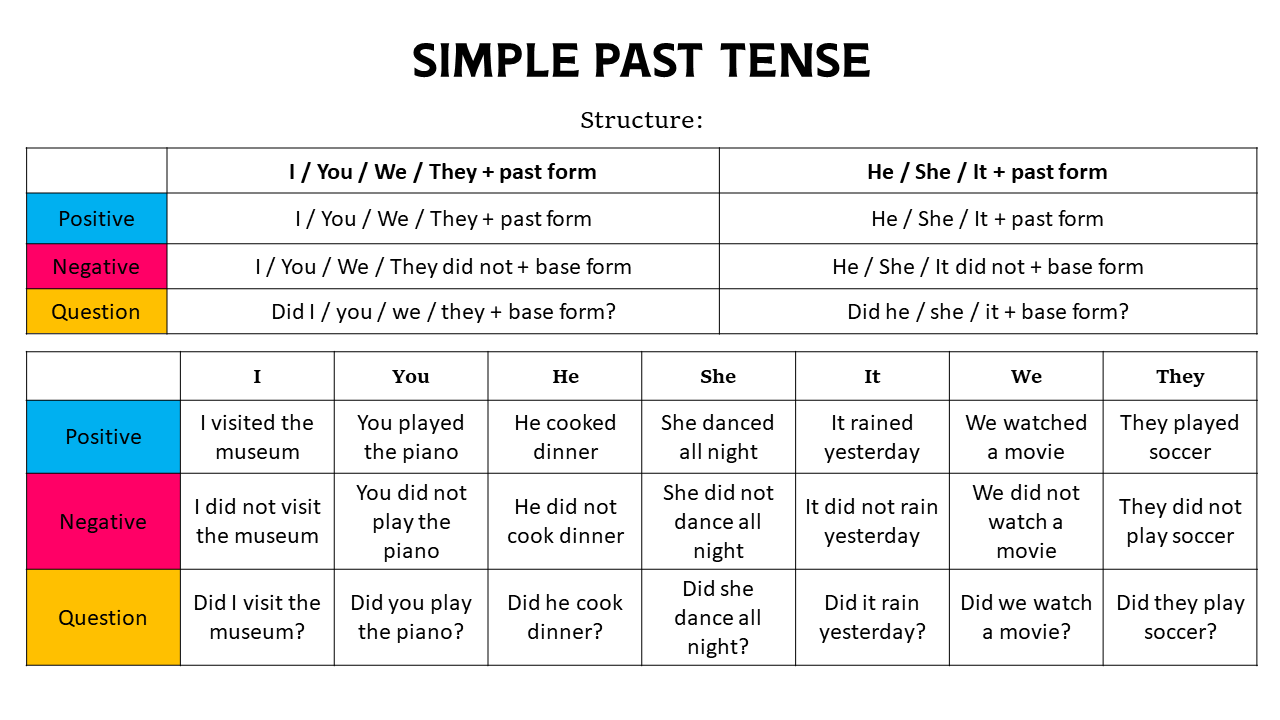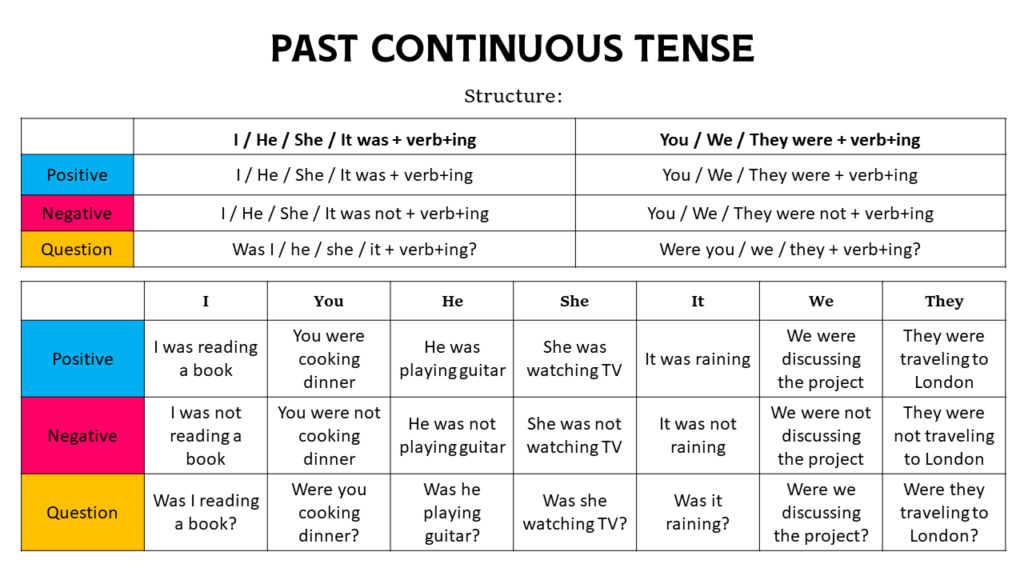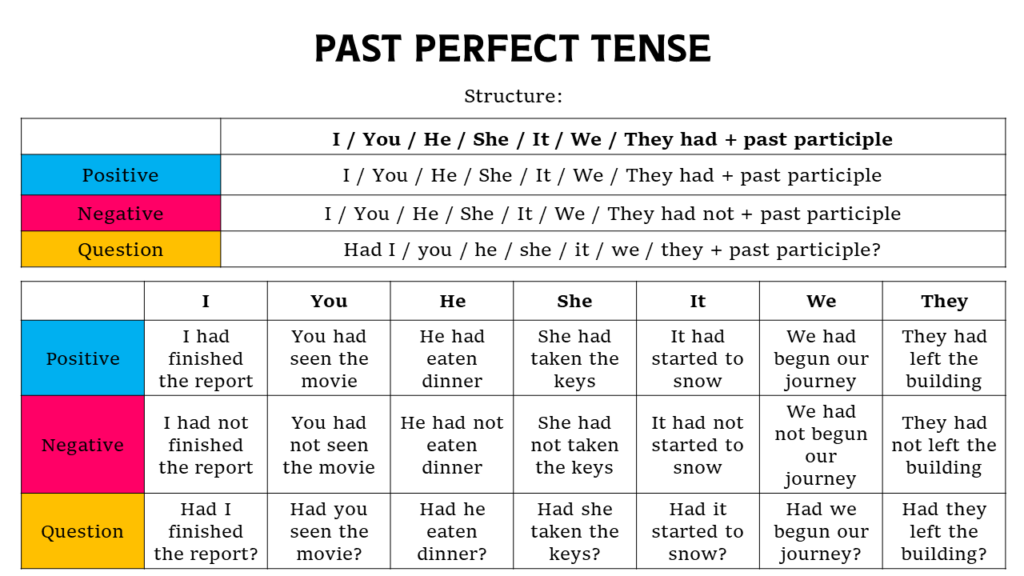The simple past tense is a cornerstone of English language storytelling, serving as the primary tool for recounting events that have concluded. Its simplicity and clarity make it indispensable for expressing completed actions, making it a fundamental aspect of both spoken and written English.
Definition
The simple past tense is used to describe actions or situations that occurred and were completed at a specific time in the past. It’s the tense of choice for telling stories, reporting past events, and expressing actions that happened once, not repeatedly.
Formula/Structure
The simple past tense is generally formed by adding -ed to the base form of regular verbs. However, the English language is rich with irregular verbs that do not follow this rule and instead have unique past tense forms. Here’s a quick overview:
- Regular verbs: Verb + ed (e.g., “I walked to the park.”)
- Irregular verbs: Unique past forms (e.g., “He went to the store.”)
Rules with Examples
- For regular verbs ending in -e, add -d: “She smiled at the joke.”
- For verbs ending in a consonant + -y, change -y to -i and add -ed: “They studied all night.”
- For one-syllable verbs ending in a single vowel + a single consonant, double the consonant and add -ed: “He slammed the door.”
- Irregular verbs must be memorized: “She saw a movie last night.”
How to Make Simple Past Tense
1. Positive Simple Past Tense
Use the simple past form of the verb to describe an action that occurred and was completed in the past.
2. Negative Simple Past Tense
Form negative sentences by adding “did not” (or “didn’t”) before the base form of the verb.
3. Interrogative Simple Past Tense
Create questions by placing “did” at the beginning of the sentence, followed by the subject and the base form of the verb.
Examples of Simple Past Tense
Examples of Positive Simple Past Tense
- “I visited my grandparents last weekend.”
- “She played the piano beautifully.”
- “We enjoyed the concert.”
- “He finished his work early.”
- “They danced all night.”
- “The movie started at seven o’clock.”
- “I cooked dinner for my family.”
- “She wrote an amazing story.”
- “The children slept through the night.”
- “We walked home after the movie.”
Examples of Negative Simple Past Tense
- “I didn’t go to the party.”
- “She didn’t like the food.”
- “He didn’t know the answer.”
- “We didn’t receive your email.”
- “They didn’t want to leave.”
- “The dog didn’t bark at the strangers.”
- “I didn’t watch the news yesterday.”
- “She didn’t take her umbrella.”
- “He didn’t pass the test.”
- “We didn’t make any noise.”
Examples of Interrogative Simple Past Tense
- “Did you enjoy the movie?”
- “Did she call you?”
- “Did he arrive on time?”
- “Did we meet them before?”
- “Did they send the letter?”
- “Did the train leave on time?”
- “Did you find your keys?”
- “Did she remember to buy milk?”
- “Did he tell you the news?”
- “Did we win the game?”

Exercise of Simple Past Tense With Answers
Questions
- I (to play) soccer yesterday.
- She (not to eat) breakfast this morning.
- (you to watch) the movie last night?
- He (to finish) his homework before dinner.
- We (not to go) to the beach last weekend.
- (they to visit) their grandparents recently?
- The cat (to sleep) on the sofa all afternoon.
- You (not to take) your umbrella, and it rained.
- (she to wear) her new dress to the party?
- They (to have) a great time at the concert.
Answers
- I played soccer yesterday.
- She didn’t eat breakfast this morning.
- Did you watch the movie last night?
- He finished his homework before dinner.
- We didn’t go to the beach last weekend.
- Did they visit their grandparents recently?
- The cat slept on the sofa all afternoon.
- You didn’t take your umbrella, and it rained.
- Did she wear her new dress to the party?
- They had a great time at the concert.
The simple past tense is a fundamental aspect of English that enables us to recount experiences, tell stories, and relay historical events. Its mastery is essential for effective communication, providing a clear and straightforward way to talk about the past.


